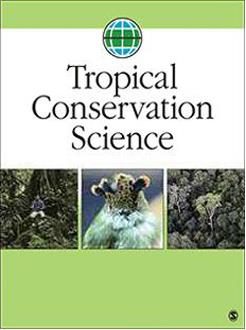The first issue of Tropical Conservation Science in 2011 marks the beginning of a fourth year of existence for the Mongabay.com open access scientific journal.
The fourth volume of TCS also marks the transition of the journal to a new publication platform: Open Journal Systems (OJS, http://pkp.sfu.ca/ojs). OJS will enable TCS to more efficiently manage manuscripts, especially in light of the rapid growth in submissions. The OJS platform streamlines and automates many aspects of manuscript submission and review, as well as the creation of journal content. It is our hope that authors and referees will find OJS an efficient system to submit their manuscripts and reviews.
The OJS platform, developed by the Public Knowledge Project ( http://pkp.sfu.ca), was created to encourage broader sharing of knowledge by providing a powerful, simple and free system for journal management. It includes built—in tools to facilitate the dissemination of research through academic indexing, RSS feeds and article sharing. This is especially important in tropical countries, where a lack of infrastructure and institutional funding often means little or no access to high—quality paid subscription journals. Many tropical scientists working in Western universities and institutions therefore must resort to sending papers to their tropical colleagues due to this ‘ivory firewall.’ As of December 2010, 7500 titles were using OJS, including these related journals:
Tropical Zoology
Ecology and Society
Ideas in Ecology and Evolution
Journal of Agriculture and Rural Development in the Tropics and Subtropics
Additionally, the cover of the first issue of volume four bears the journal's new logo (shown below); a symbol of the tropical world wrapped around the equator. It reflects the diverse, pantropical coverage of the journal's articles and authors, unified in their shared goal of understanding, protecting and promoting the conservation of tropical nature to the benefit of all species and peoples.
Current Issue of TCS
The first issue of 2011 contains 10 papers: an opinion article, six research articles, two short communications and a book review.
The opinion article tackles the issue of large mammal population declines in West—Central Africa's protected areas. West—Central Africa has experienced a considerable decline in rainfall and large mammals since 1970; the author builds this into a framework that connects herbivore physiology and behavior with environmental gradients. Unfortunately, declines in Africa's protected areas are not limited to large mammals, but also include large birds of prey.
The six research articles comprise five case studies and a paper dealing with an assessment of the volume of published information on ecological research in the Andes and the Amazon for the period 1995–2008. The paper reveals broad regional variation in study intensity across this hyper—diverse continent and recommends strategies to expand research output and reduce geographical bias.
The case studies cover a diverse range of topics such as the conservation of endemic flightless dung beetles in cloud forests in Western Ghats, India; the conservation impact of leaf harvesting for thatching on an Amazonian understory palm in Colombia; rotational grazing by cattle on native pastures and the conservation of the Pantanal ecosystem in Brazil; assessment of the efficiency of surveys of orangutan populations in Sumatra using nest counts; and logged forests in southern Vietnam as a tool to preserve local biodiversity.
The short communications share an interest in assessing the impact of invasive species on local biodiversity and economies in the tropics. While one discusses the potential threat of an African land snail in Singapore and Southeast Asia, the other documents invasive plant species in a live gene bank in Nigeria.
Finally, for the first time, TCS publishes a book review. The book being reviewed deals with tropical forest restoration in the Asia Pacific region, a theme of broad interest to tropical scientists, especially those attempting to counteract the effect of massive deforestation in this region and the tropics as a whole.
In short, the papers in the current issue cover a broad spectrum of conservation issues in the tropics based on studies in Central and West Africa, the Colombian and Brazilian Amazon, Pantanal in Brazil, Western Ghats in India, Sumatra, Singapore, Vietnam, and Nigeria.






